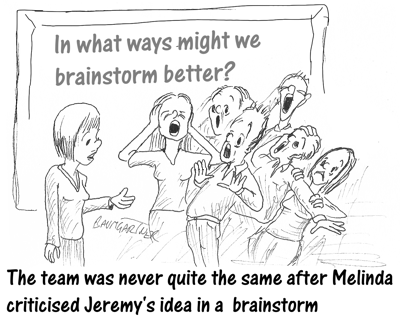Actually, Criticizing Ideas Is Good for Creativity By Jeffrey Baumgartner

Ever since it was first invented by Alex Osborn in the 1950s or so, the fundamental rule of brainstorming, and just about every creative thinking method, has been, “Though shalt not criticise ideas.”
Mr Osborn never made it entirely clear why it is so bad to criticise ideas, though it is implied that you might hurt people’s feelings, inhibit creativity and possibly emotionally scar someone for life. Clearly then it is best to welcome all ideas with compliments, even if they are stupid, and never, ever criticise an idea. At least, that was the assumption
No one dared question this assumption for more than half a century − until 2008 when a couple of bright sparks at Berkeley University, Matthew Feinberg and Charlan Nemeth*, decided it was time to ask some questions. They conducted a study in which they put volunteers into teams and divided those teams into three three groups. One group followed traditional brainstorming rules. The second group were also told to follow brainstorming protocol with the exception that they were actively encouraged to criticise ideas. The third group was the control group. They were just told to come up with ideas any way they wanted to do.
So, what happened?
The control group’s outcome was the least creative. Only moderately better were the traditional brainstormers. By far the most creative group was the group that had been encouraged to criticise ideas.
This surprised a lot of people, especially people involved in creative facilitation. Their fundamental rule had been proven to be, well, completely wrong. Many professional brainstorming facilitators simply denied the results rather than accept their method might be flawed.
Others tried brainstorming and other ideation methods in which we actively encourage criticism during the ideation. I certainly did. And, I found it was surprisingly effective. In my experience, results are far better than when criticism is forbidden.
I believe there are several reasons why this is so.
- Blindly praising every idea encourages mediocrity. Why be bold when your boring ideas get praise?
- Criticising an idea starts a conversation about the idea as well as your needs, restrictions, assumptions and more. When ideas cannot be criticised, you cannot delve into them. You cannot really discuss them. You certainly cannot build upon them until you’ve discovered the weaknesses that need improving.
- Criticising an idea gives it importance. When all ideas are “great” the compliment becomes meaningless. When someone stops to listen to an idea, thinks about it and addresses its weaknesses, she is saying, “this idea has meaning to me. I want to talk about it.”
- Criticising ideas gives guidance. If an idea is criticised, debated and rightly found not to be viable, this tells people to think in a new direction.
No Downward Spiral
Brainstorm fans often worry that allowing criticism of ideas will lead to a downward spiral where everyone is negative and no new ideas are developed. In my experience, this does not happen. I believe it is because when a group of people in an organisation are trying to build ideas, they have a common goal in building a relevant idea that achieves their needs. Bring relentlessly critical will not get them to their goal. Being productively critical will.
Three Rules
In anticonventional thinking (ACT), an alternative to brainstorming that encourages criticism, there are three rules.
- Always criticise boring, conventional ideas. You do not want them.
- Criticises the idea is OK; criticising the person is not OK.
- Once you have criticised and idea, shut up and let the originator of the idea, or anyone else, defend it.
I have found these rules, together with encouragement to criticise ideas, ensures that critical discussions are meaningful and feelings are not hurt. Ironically, several people have told me after ACT sessions that criticism of ideas makes them feel freer and less constricted than when they cannot criticise ideas.
Go On, Give It a Try
If you run brainstorms and have always adhered to Mr Osborn’s rule that you must withhold criticism, I suggest you experiment with ideation that welcomes crticism and see what happens. Mr Osborn surely would not mind. After all, he was a fan of creativity and trying out new ideas. Moreover, I believe you will be pleasantly surprised by the results.
- Published in Blog
AXA Mansard rated among Top 50 Brands in Nigeria
AXA Mansard Insurance continues to receive top ratings amongst other brands. AXA Mansard Insurance was rated among the Top 50 Brands in Nigeria by APT Brand International Limited.
Top 50 Brands in Nigeria is an annual selection of top brands in Nigeria. The award criteria include leadership structure, market acceptance, brand equity, product offerings, culture, quality service delivery and market performance.
The record is indeed significant for AXA Mansard Insurance as it is the only insurance company to receive this outstanding recognition along with other highly rated brands in the country.
The Chief Client Officer, Tosin Runsewe commented that “Our brand has grown over time and has become a symbol of our desire to keep evolving new ways of pleasing our customers. The value of our brand represents the value we place on our customers and serves as a hallmark of our brand promise to them to protect their assets, health and loved ones”.
Adding to this, the Group Head Strategy and Marketing, Kola Oni, says “We are delighted to receive this award for the second year in a row. The AXA Mansard brand is unique and this award is dedicated to our customers who have supported us over time even as they recognize and appreciate the AXA Mansard experience”.
- 1
- 2

